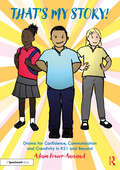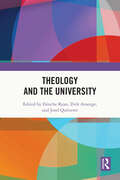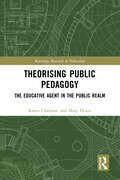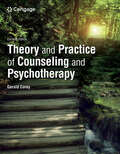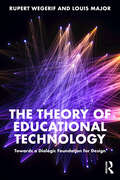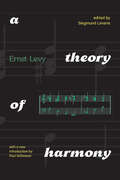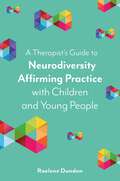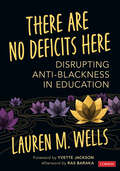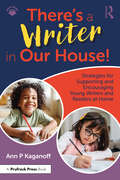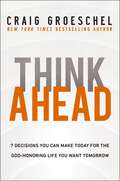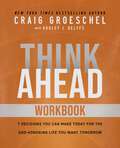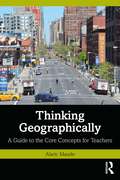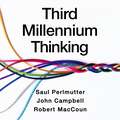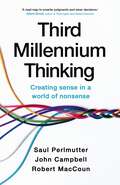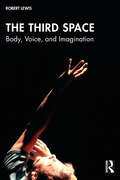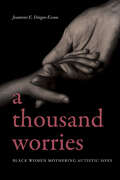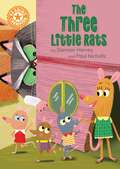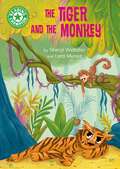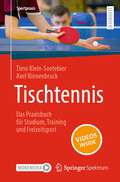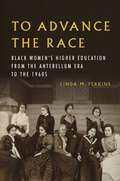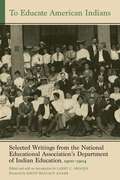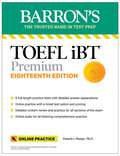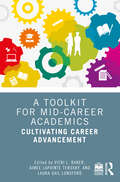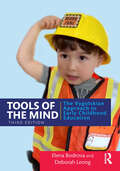- Table View
- List View
That's My Story!: Drama for Confidence, Communication and Creativity in KS1 and Beyond
by Adam Power-AnnandThe ability to communicate is an essential life skill for all children and young people and it underpins their social, emotional and educational development. If a child experiences a positive relationship with an adult listening carefully, they are more likely to constructively share their thoughts, feelings and their imaginative ideas.That’s My Story! places children’s imagined stories at the heart of their own development and provides a joyful, creative approach to support young children’s personal and social development and to encourage their communication. In this book you will find: Tried-and-tested drama games and activities that support communication and well-being, all adaptable to complement your current practice Guidance and advice on how to promote positive adult-child interactions Examples of creative interventions that support children’s communication development A celebration of the joy that comes with carefully listening to children’s own imagined stories Those of us who work with children can sense a tangible connection between how young children feel and how they communicate. This essential and practical resource will be valuable reading for primary teachers, teaching assistants, speech and language therapists, and drama practitioners, as well as outreach and education departments of theatre companies and other arts organisations.
Theology and the University
by Fáinche Ryan Dirk Ansorge Josef QuittererTheology and the University presents a compelling argument as to why theology still matters. It considers how theology has been marginalised in the academy and in public life, arguing that doing so has serious repercussions for the integrity of the academic study of religion.The chapters in this book demonstrate how theology, as the only discipline which represents religion from within, provides insight into aspects of religion which are hidden from the social sciences. Against a backdrop of heated debates on the role of the humanities in the university, the book highlights the specific contribution of theological education and research to the work of a university, providing essential information for academic and social/political decision-making. Whilst the book has an emphasis on the Catholic tradition, it explores the prospect of fruitful complementarity and interdisciplinarity both with secularised studies of religion, and other disciplines in the university, such as literature, philosophy, and the social sciences.This book provides orientation for decision-makers, particularly those concerned with the broader question of humanities in the university; students in their choice of study; those interested in the wellbeing of today’s universities; and ecclesial authorities seeking to form leaders capable of intelligent responses to the issues of contemporary society. It is a must read for all researchers of theology, as well as anyone interested in the role of the humanities more broadly.
Theorising Public Pedagogy: The Educative Agent in the Public Realm (Routledge Research in Education)
by Karen Charman Mary DixonDrawing on the ideas of Hannah Arendt and Michel Foucault, this book extends the theoretical understanding of public pedagogy and brings into sharp focus the elements that constitute the public realm; the site of public pedagogy. Karen Charman and Mary Dixon offer a new theorisation of the public, a term at the heart of debate in the field, heightened in this post-truth era by the COVID-19 pandemic, the rise of fake news and the technological reconfigurations of public life. The new theorization addresses the ‘public’, ‘pedagogy’ and their confluence in ‘public pedagogy’. The book explores a deep engagement with the architecture and dynamics of pedagogy and argues for the positioning of pedagogy with the public. The authors contribute to a theorisation that re-considers the individual and their capacity for agency within the public realm. The book presents knowledge and pedagogical encounters as key elements of public pedagogy and most significantly, the educative agent as a means of critically rethinking social life and learning in public spaces. Presenting an innovative theoretical approach, this book will be of interest to academics in the fields of public and critical pedagogy and postgraduate students in education, cultural studies and politics.
Theory and Practice of Counseling and Psychotherapy
by Gerald CoreyIncorporating the thinking, feeling and behaving dimensions of human experience, the Eleventh Edition of Corey's best-selling text offers an easy-to-understand guide to help you compare and contrast the therapeutic models expressed in counseling theories. This wide-ranging text provides a thorough introduction to major theories including psychoanalytic, Adlerian, existential, person-centered, Gestalt, reality, behavior, cognitive-behavior, family systems, feminist, postmodern and integrative approaches. <p><p>With his trademark style, the author also demonstrates how each theory can be applied to two cases (""Stan"" and “Gwen”), providing valuable practical insights and helping you learn to integrate the theories into an individualized counseling style. In addition, the text features engaging media resources, available through MindTap, such as case-focused videos to help bring the material vividly to life.
The Theory of Educational Technology: Towards a Dialogic Foundation for Design
by Rupert Wegerif Louis MajorEducational technology is controversial – some see it as essential to providing free global learning, others view it as a dangerous distraction that undermines good education. In both instances, most theories that have previously been applied to educational technology do not account for the distinctive nature and vast potential of technology. This book addresses this issue, exploring how education has been bound up with technology from the beginning, and recognising that educational aims have already been shaped by technologies. Offering a ‘dialogic’ theory of educational technology, Rupert Wegerif and Louis Major respond to contemporary challenges to education within this book, including, but not limited to, climate change, misinformation on the internet and the impact of Artificial Intelligence. Chapters introduce, discuss, and contextualise key theories and illustrate through case studies their uses within a diverse range of educational contexts, spanning from primary education to adult lifelong learning. Each chapter also concludes with a short summary, demonstrating how these theories translate to practical implications for design. A fascinating response to current developments in educational technology, this is a crucial read for all involved in creating, researching or making decisions about the use of technologies within educational contexts.
A Theory of Harmony: With A New Introduction by Paul Wilkinson
by Ernst LevyErnst Levy was a visionary Swiss pianist, composer, and teacher who developed an approach to music theory that has come to be known as "negative harmony." Levy's theories have had a wide influence, from young British performer/composer Jacob Collier to jazz musicians like Steve Coleman. His posthumous text, A Theory of Harmony, summarizes his innovative ideas. A Theory of Harmony is a highly original explanation of the harmonic language of the modern era, illuminating the approaches of diverse styles of music. By breaking through age-old conceptions, Levy was able to reorient the way we experience musical harmony.British composer/music pedagogue Paul Wilkinson has written a new introduction that offers multiple points of entry to Levy’s work to make this text more accessible for a new generation of students, performers, and theorists. He relates Levy's work to innovations in improvisation, jazz, twentieth-century classical music, and the theoretical writings of a wide range of musical mavericks, including Harry Partch, Hugo Riemann, and David Lewin. Wilkinson shows how A Theory of Harmony continues to inspire original musical expression across multiple musical genres.
A Therapist’s Guide to Neurodiversity Affirming Practice with Children and Young People
by Raelene DundonIn this honest and practical guide, autistic therapist Raelene Dundon explores and demystifies how neurodiversity affirming principles can be easily applied to therapeutic practice.Covering essential considerations for working with neurodivergent clients such as presuming competence, promoting autonomy and respecting communication styles, and providing advice on the best affirming approaches in therapy including how to accommodate sensory needs and encourage self-advocacy, Raelene provides easy-to-implement ways to make your practice inclusive and empowering for neurodivergent children and young people.The deficit model is out. It's time to become neurodiversity affirming.
There Are No Deficits Here: Disrupting Anti-Blackness in Education
by Lauren M. WellsDisrupt the deficit beliefs that steal belonging, purpose, pride, and joy from Black students School reform efforts have long dominated the educational landscape, but the fixes that characterize many school improvement initiatives swing on the hinges of deficit beliefs about Black students. This book calls for a disruption in these models and urges educators to take seriously the significance of beliefs and cultures within schools. Focused on racial equity from an ecological perspective and designed to propel readers to examine individual and systemic beliefs operating in their ecosystems, this book provides Details on emancipatory educational ecosystems governed by beliefs that affirm Black children and immerse them in learning where their identities matter A set of beliefs that work together to create collective mindsets needed to power change A counternarrative of how interrelationships and interdependence govern healthy systems by challenging the meritocracy, competition, and individualism. Grounded in extensive research and personal experience showcasing large-scale change efforts in major urban areas, Wells’ approach toward emancipatory educational ecosystems enables affirming beliefs to guide the work.
There Are No Deficits Here: Disrupting Anti-Blackness in Education
by Lauren M. WellsDisrupt the deficit beliefs that steal belonging, purpose, pride, and joy from Black students School reform efforts have long dominated the educational landscape, but the fixes that characterize many school improvement initiatives swing on the hinges of deficit beliefs about Black students. This book calls for a disruption in these models and urges educators to take seriously the significance of beliefs and cultures within schools. Focused on racial equity from an ecological perspective and designed to propel readers to examine individual and systemic beliefs operating in their ecosystems, this book provides Details on emancipatory educational ecosystems governed by beliefs that affirm Black children and immerse them in learning where their identities matter A set of beliefs that work together to create collective mindsets needed to power change A counternarrative of how interrelationships and interdependence govern healthy systems by challenging the meritocracy, competition, and individualism. Grounded in extensive research and personal experience showcasing large-scale change efforts in major urban areas, Wells’ approach toward emancipatory educational ecosystems enables affirming beliefs to guide the work.
There's a Writer in Our House! Strategies for Supporting and Encouraging Young Writers and Readers at Home
by Ann P. KaganoffThere’s a Writer in Our House! is an invitation to parents of children in first grade through fifth grade interested in actively participating in their children’s early literacy learning from the very first steps.Founded upon well-researched literacy instructional methods that have been informed by the author’s clinical perspective as well as her years of experience with many kinds of learners, this book provides a valuable understanding of how both writing and reading contribute to child development in multiple areas. Chapters provide background concepts regarding grammar and specific critical thinking skills in both writing and reading as well as customizable, child-centered activities used to practice and build writing and reading comprehension skills.You will learn how to advance and encourage your child’s learning and communication skills by highlighting important literacy areas such as vocabulary development, background knowledge, and critical thinking. You will also learn to recognize and track the significant developmental achievements of your child as you proceed from the early to the more complex At-Home activities, as well as receive strategies for how to respond and give feedback in specific situations, such as when a child writes something that makes sense to the child but not to the parent, how to offer feedback that identifies and labels a child’s strengths, and how to collaborate effectively with a child who is just developing new interests or a new willingness to try something that previously seemed “hard.”Practical, accessible, and most importantly, fun, this book is a must-read for all parents, regardless of background, seeking to support their children’s ongoing literacy development confidently and effectively.
Think Ahead: 7 Decisions You Can Make Today for the God-Honoring Life You Want Tomorrow
by Craig GroeschelWhy do we keep making choices we later regret--sometimes even the same bad choices over and over? Drawing on Scripture, story, and cutting-edge research into human behavior, pastor Craig Groeschel reveals the key to making the choices we want to make and experiencing the joy and freedom God has for us.We all want to make great decisions. So what happens between our good intentions and the choices we actually make in the moment? If only we could make decisions ahead of time rather than when we're under stress, overwhelmed, or swayed by fear or emotion. In Think Ahead, we learn how to do just that.Pastor Craig Groeschel knows from personal experience and as a counselor to others what being trapped in a cycle of poor decision-making is like. In Think Ahead, he shares what he has discovered about the power of "pre-deciding."With thought-provoking exercises and questions for reflection, this interactive book teaches us that the quality of our decisions determines the quality of our lives. Think Ahead will help you:Understand the science behind your decision-making habitsOvercome decision fatigue and debilitating fearsDiminish the role of emotions in decision-makingSee how your small choices shape the kind of person you becomeDefine and put into action the seven life-defining pre-decisions you can make today Becoming the person you want to be starts before you even make a decision. In Think Ahead, you'll discover the power of making decisions today to help you live the life you want to have tomorrow.
Think Ahead Workbook: The Power of Pre-Deciding for a Better Life
by Craig GroeschelWe all want to make great decisions, but frequently, we don&’t. When the moment of truth arrives, we make choices that we later regret. It causes us to wonder if we actually can begin to make better decisions for our lives.Pastor and bestselling author Craig Groeschel understands this dilemma that we all face. From both personal experience and as a minister and counselor to others, he knows what it is like to be trapped in a cycle of bad decision-making. But over time, he has discovered how to short-circuit the bad-decision cycle, make wise decisions, and begin to become the person God wants us to be.In the Think Ahead Workbook, which accompanies the book of the same name, Craig draws on the truth of Scripture and the latest research in human behavior to reveal the power of making decisions in advance—what we might call &“pre-deciding&”—to position ourselves to make the choices we really want to make and avoid those choices that we do not want to make. In the process, he reveals:The science behind many of our decision-making habitsHow our small choices shape the kind of people we becomePractical steps we can employ to combat decision fatigueHow to develop the ability to diminish the role of emotions in decision-makingAre you ready to choose who you will become and live the life you really want to live? If so, this workbook will provide you with a clear biblical path on how to get there and think ahead.
Thinking Geographically: A Guide to the Core Concepts for Teachers
by Alaric MaudeThis book explains how the concepts of geography can teach young people to think geographically, deeply and ethically. Thinking Geographically demonstrates how the concepts of place, space, environment and interconnection teach students new ways of perceiving and understanding the world, the concepts of scale and time teach them ways of analysing the world, while the concepts of sustainability and wellbeing show them how to evaluate and reflect on what they observe, and all eight concepts develop their higher order and critical thinking. To further support teachers, this book includes a chapter on how to teach for conceptual understanding, as well as two chapters that illustrate the application of geographical thinking to an understanding of the effects of land cover change and the problem of regional inequality. Rich with practical examples, this book is an essential resource for geography teachers, whether already teaching or studying to become one, and for those who teach therm.
Third Millennium Thinking: Creating Sense in a World of Nonsense
by Saul Perlmutter Robert MacCoun John Campbell*Available for pre-order: a definitive guide to thinking clearly in a world full of overwhelming information*__________A Nobel prize-winning physicist, a social psychologist and a philosopher on how science can help us navigate information overload, thrive amidst uncertainty and heal our fractured society.In our deluge of information, it's getting harder and harder to distinguish the revelatory from the contradictory. How do we make health decisions in the face of conflicting medical advice? How can we navigate the next uncomfortable discussion with family members, who follow completely different experts on climate?In Third Millennium Thinking, a physicist, a psychologist, and a philosopher introduce readers to the tools and frameworks that scientists use to keep from fooling themselves, to understand the world, and to make decisions. We can all borrow from these trust-building techniques that scientists have tested and developed for more than two millennia to tackle problems both big and small.Listeners will learn:- How to gain a solid understanding of the facts that shape our modern world- How to navigate through a multitude of possibilities and make informed choices- How to collaborate effectively in tackling the challenges we encounter today- And much moreThrough engaging thought exercises, clear language free from technical jargon, and compelling illustrations drawn from history, everyday life, and insider stories of scientists, Third Millennium Thinking presents a fresh approach for readers to untangle the confusing and make sense of it all.__________'A model of clear thinking, and a terrific discussion of how to use logic and evidence to solve the hardest problems. This might just be the cure for what ails us.' Cass R. Sunstein, Robert Walmsley University Professor, Harvard University, and author of Decisions About Decisions
Third Millennium Thinking: Creating Sense in a World of Nonsense
by Saul Perlmutter Robert MacCoun John Campbell*Available for pre-order: a definitive guide to thinking clearly in a world full of overwhelming information*__________In our deluge of information, it's getting harder and harder to distinguish the revelatory from the contradictory. How do we make health decisions in the face of conflicting medical advice? How can we navigate the next uncomfortable discussion with family members, who follow completely different experts on climate?In Third Millennium Thinking, a physicist, a psychologist, and a philosopher introduce readers to the tools and frameworks that scientists use to keep from fooling themselves, to understand the world, and to make decisions. We can all borrow from these trust-building techniques that scientists have tested and developed for more than two millennia to tackle problems both big and small.Readers will learn:- How to gain a solid understanding of the facts that shape our modern world- How to navigate through a multitude of possibilities and make informed choices- How to collaborate effectively in tackling the challenges we encounter today- And much moreThrough engaging thought exercises, clear language free from technical jargon, and compelling illustrations drawn from history, everyday life, and insider stories of scientists, Third Millennium Thinking presents a fresh approach for readers to untangle the confusing and make sense of it all.__________'A model of clear thinking, and a terrific discussion of how to use logic and evidence to solve the hardest problems. This might just be the cure for what ails us.' Cass R. Sunstein, Robert Walmsley University Professor, Harvard University, and author of Decisions About Decisions
The Third Space: Body, Voice, and Imagination
by Robert LewisThe Third Space serves a crucial need for contemporary performers by providing an interdisciplinary and physiovocal approach to training. It is a new take on body and voice integration designed to develop the holistic performer. It takes performers through a series of step-by-step practical physiovocal exercises that connects the actor’s centre to the outside world, which increases awareness of self and space. It also develops a deeper connection between spaces within the body and the environment by connecting sound, imagination, and movement.Robert Lewis’s approach is a way of working that unlocks the imagination as well as connecting performers to self, space, and imagination, through voice and body. It conditions, controls, and engages performers by integrating various voice and movement practices.The theories and practice are balanced throughout by: introducing the practical works theoretical underpinnings through research, related work, and case studies of performances; demonstrating a full program of exercises that helps performers get in touch with their centre, their space, and shape both within and outside the body; and exploring the performers physiovocal instrument and its connection with imagination, energies, and dynamics. This book is the result of nearly 20 years of research and practice working with voice and movement practitioners across the globe to develop training that produces performers that are physiovocally ready to work in theatre, screen, and emergent technologies.
A Thousand Worries: Black Women Mothering Autistic Sons (SUNY series in Black Women's Wellness)
by Jeannine E. Dingus-EasonAutism is rising across the United States but disproportionately affects Black children and their families. While White middle-class families tend to be the focus of autism research and services, A Thousand Worries tells the stories of fifteen Black mothers of autistic sons, including the author’s own story. Interweaving her personal experience and research findings, Jeannine E. Dingus-Eason examines the intersections of race, class, and gender and the complexities of parenting, care, and services for Black autism mothers, or BAMs. Dingus-Eason shows how BAMs leverage their faith, support networks, and knowledge of autism to advocate for their sons in cultural and sociopolitical contexts that consistently dehumanize, criminalize, and adultify Black boys. A Thousand Worries will give families, scholars, and practitioners in education, social work, human services, and health insight into not only BAMs' many concerns and challenges but also their strengths, strategies, and abiding love. At times moving, uplifting, funny, and raw, their testimonies illuminate the power dynamics between parents and providers, the value of supportive partnerships and mutual trust, and the need for culturally responsive services.
The Three Little Rats: Independent Reading Orange 6 (Reading Champion #1610)
by Damian HarveyThis story is part of Reading Champion, a series carefully linked to book bands to encourage independent reading skills, developed with Dr Sue Bodman and Glen Franklin of UCL Institute of Education (IOE)In this new story based on The Three Little Pigs fairy tale, Three Little Rats leave their mum to make their own homes, closely followed by the farmer's cat! Fantastic, original stories are accompanied by engaging artwork and a reading activity. Each book has been carefully graded so that it can be matched to a child's reading ability, encouraging reading for pleasure. Perfect for 5-7 year olds or those reading book band purple 8.
The Tiger and the Monkey: Independent Reading Green 5 (Reading Champion #517)
by Sheryl WebsterThis story is part of Reading Champion, a series carefully linked to book bands to encourage independent reading skills, developed with Dr Sue Bodman and Glen Franklin of UCL Institute of Education (IOE) Fantastic, original stories are accompanied by engaging artwork and a reading activity. Each book has been carefully graded so that it can be matched to a child's reading ability, encouraging reading for pleasure. Perfect for 5-7 year olds.In this twist on the traditional Aesop fable The Lion and the Mouse, a tiger is caught in a trap, and only a tiny monkey can rescue him.
Tischtennis – Das Praxisbuch für Studium, Training und Freizeitsport (Sportpraxis)
by Timo Klein-Soetebier Axel BinnenbruckDieses Lehrbuch verknüpft erstmals wissenschaftliche Erkenntnisse zu der Sportart Tischtennis mit praktischen Handlungsempfehlungen für Training und Wettkampf. Es wurde in enger Zusammenarbeit mit dem Deutschen Tischtennis-Bund (DTTB) konzipiert und richtet sich insbesondere an Sport-Studierende mit Praxismodulen sowie an trainingswissenschaftlich- und pädagogisch-interessierte Trainer*innen und Übungsleiter*innen im Breiten- und Freizeitsport.Mithilfe der Buchinhalte können Sie die technischen und taktischen Elemente der Sportart Tischtennis erlernen und Ihre Spielfähigkeit unter verschiedenen Wettkampfbedingungen – z. B. Doppel und Einzel – weiterentwickeln. Darüber hinaus lernen Sie als Trainer*in praxisnahe didaktisch-methodische Ansätze kennen, um unterschiedliche Schwerpunkte zu setzen und ein angepasstes Tischtennistraining für nahezu jede Zielgruppe planen und durchführen zu können.Abrufbare Videos, beispielsweise zum Aufschlagtraining oder zur Beinarbeitstechnik, veranschaulichen Trainingsinhalte und ermöglichen einen einfachen Praxistransfer. Zusätzlich erhalten Sie einen vertiefenden Einblick in die Besonderheiten, Alleinstellungsmerkmale und aktuellen Entwicklungen im Tischtennis. Insgesamt bietet dieses Lehrbuch die optimale Basis sowohl für Ihre eigene persönliche Entwicklung im Tischtennis als auch für die Wissensvermittlung an zukünftige Instrukteure dieser Sportart.
To Advance the Race: Black Women's Higher Education from the Antebellum Era to the 1960s
by Linda M. PerkinsFrom the United States' earliest days, African Americans considered education essential for their freedom and progress. Linda M. Perkins’s study ranges across educational and geographical settings to tell the stories of Black women and girls as students, professors, and administrators. Beginning with early efforts and the establishment of abolitionist colleges, Perkins follows the history of Black women's post–Civil War experiences at elite white schools and public universities in northern and midwestern states. Their presence in Black institutions like Howard University marked another advancement, as did Black women becoming professors and administrators. But such progress intersected with race and education in the postwar era. As gender questions sparked conflict between educated Black women and Black men, it forced the former to contend with traditional notions of women’s roles even as the 1960s opened educational opportunities for all African Americans. A first of its kind history, To Advance the Race is an enlightening look at African American women and their multi-generational commitment to the ideal of education as a collective achievement.
To Educate American Indians: Selected Writings from the National Educational Association's Department of Indian Education, 1900–1904 (Indigenous Education #1)
by Larry C. SkogenTo Educate American Indians presents the most complete versions of papers presented at the National Educational Association&’s Department of Indian Education meetings during a time when the debate about how best to &“civilize&” Indigenous populations dominated discussions. During this time two philosophies drove the conversation. The first, an Enlightenment era–influenced universalism, held that through an educational alchemy American Indians would become productive, Christianized Americans, distinguishable from their white neighbors only by the color of their skin. Directly confronting the assimilationists&’ universalism were the progressive educators who, strongly influenced by the era&’s scientific racism, held the notion that American Indians could never become fully assimilated. Despite these differing views, a frightening ethnocentrism and an honor-bound dedication to &“gifting&” civilization to Native students dominated the writings of educators from the NEA&’s Department of Indian Education. For a decade educators gathered at annual meetings and presented papers on how best to educate Native students. Though the NEA Proceedings published these papers, strict guidelines often meant they were heavily edited before publication. In this volume Larry C. Skogen presents many of these unedited papers and gives them historical context for the years 1900 to 1904.
TOEFL iBT Premium with 8 Online Practice Tests + Online Audio, Eighteenth Edition (Barron's Test Prep)
by Pamela J. Sharpe Ph.D.Barron&’s newest edition of TOEFL iBT has been fully updated to reflect the new TOEFL format and provides flexible study options and key skills review to help you study what you need to know for the test. This edition includes: 8 full-length TOEFL iBT practice tests that reflect the most recent test format with answer explanations Comprehensive review of required academic and language skills Four video lessons on the key skills needed to succeed on the TOEFL: Note Taking, Paraphrasing, Summarizing, and Synthesis Grammar review that supports the Speaking and Writing Sections Online audio for all listening prompts
A Toolkit for Mid-Career Academics: Cultivating Career Advancement
by Vicki L. Baker Aimee LaPointe Terosky Laura Gail LunsfordMid-career faculty are the backbone of the college and university workforce and represent the largest population of faculty in the academy, yet they face myriad challenges that hinder career satisfaction and advancement.This book offers action-oriented tools to engage (or re-engage) mid-career programming at the individual faculty, institutional, consortial, and grant-funded levels. Bringing together leading scholars and practitioners engaged in research and practice, this edited volume offers solutions to two driving questions faced by mid-career faculty: “what’s next" and “how to navigate.” This focus on both what and how highlights critical issues and challenges associated with mid-career coupled with specific tools and strategies to successfully navigate from diverse stakeholder perspectives. Jargon-free and rich with stories from the field, each chapter can serve as a stand-alone resource, be read in order as presented, or be read non-sequentially based on the reader’s specific needs.Mid-career faculty, including non-tenure-track and community college academics, will welcome the resources, tools, and strategies featured throughout this book, the “pocket professional development mentor” to help create more inclusive and equitable programming at multiple levels.
Tools of the Mind: The Vygotskian Approach to Early Childhood Education
by Elena Bodrova Deborah LeongNow in its third edition, this classic text remains the seminal resource for in-depth information about major concepts and principles of the cultural-historical theory developed by Lev Vygotsky, his students, and colleagues, as well as three generations of neo-Vygotskian scholars in Russia and the West. Featuring two new chapters on brain development and scaffolding in the zone of proximal development, as well as additional content on technology, dual language learners, and students with disabilities, this new edition provides the latest research evidence supporting the basics of the cultural-historical approach alongside Vygotskian-based practical implications. With concrete explanations and strategies on how to scaffold young children’s learning and development, this book is essential reading for students of early childhood theory and development.
